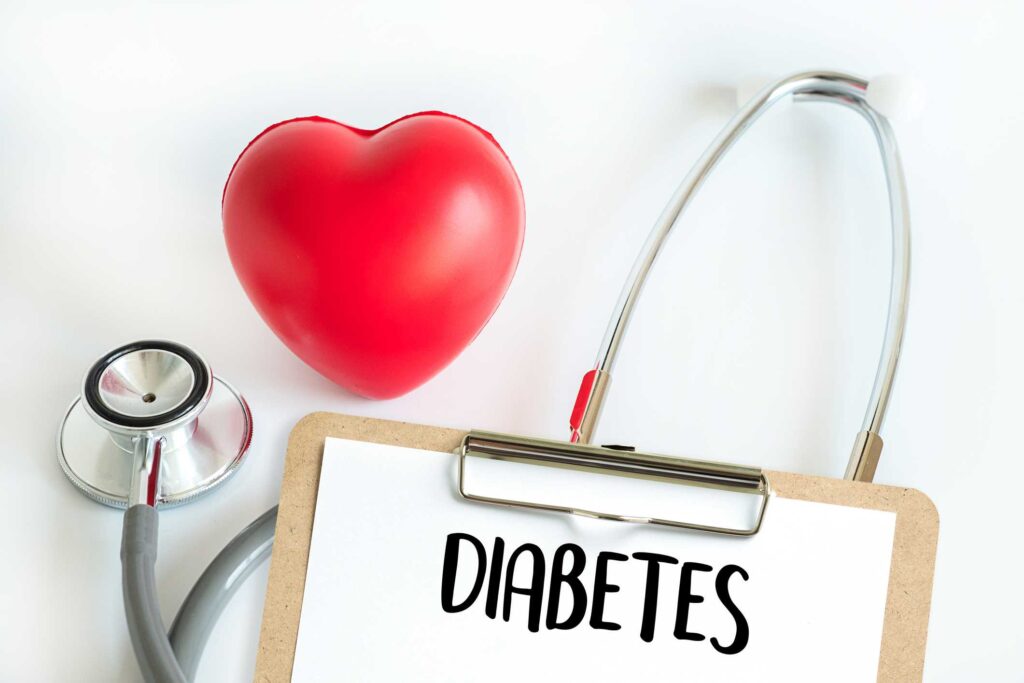
A 75-year-old man, Julius Ekundayo Omololu, who has lived with diabetes for 20 years, has shared his pain, resilience, and the lessons he has learned while managing his condition as the global community marks World Diabetes Day today. The theme for this year is; “Diabetes Across Life Stages.”
In an interview with Daily Trust, the septuagenarian said he was diagnosed with Type 2 diabetes in 2005.
He said, “It all started after I had an injury on my left foot that refused to heal. When I was taken to the University of Abuja Teaching Hospital, the doctors explained that it was diabetes that prevented the wound from healing properly. My blood sugar was over 400 mg/dL — the doctor said it was a miracle I was still conscious.
“When I heard the word diabetes, I didn’t even know what it meant. The doctor explained that it’s a chronic condition that has no cure but can be managed. Honestly, I cried that day. I thought my life was over. Sadly, the leg had to be amputated. I’ve been living with the condition ever since.”
When asked about the biggest challenges he faced managing his condition, Elder Omololu said, “The biggest challenge is consistency — staying faithful to medication, diet, and lifestyle changes. It’s a lot of discipline. Every meal I eat has to be planned. I can’t just pick a snack or drink soda like everyone else.
“Another big challenge is cost. Diabetes management is expensive in Nigeria. From drugs to test strips and clinic visits, everything takes money. The stress of that alone can make my sugar go up.
“Also, the psychological burden is real. Some days, I wake up feeling tired and depressed because I’m constantly reminded that this is a lifelong journey. But faith and family support keep me going.”
Speaking on how diabetes had affected his lifestyle, he said, “It has changed my life completely. Before my diagnosis, I used to love sweet things — soft drinks and sugar canes. Now, my meals are measured carefully. I eat more vegetables, whole grains, and fish. It’s not easy because healthy food is more expensive. But I’ve learned that my life depends on what I eat.
“Emotionally, it has made me more health-conscious. My wife and children also changed their eating habits because of me. So, in a way, it has brought us closer as a family.”
On the amount of money he typically spends on drugs every month, he said, “When I was first diagnosed, I was spending around N5,000 monthly, but now on average, I spend between N30,000 and N40,000 monthly. I test my sugar at least twice daily. Then, there are clinic appointments, transport, and the cost of maintaining a healthy diet — vegetables, fruits, and lean protein.
“I know many diabetic patients who ration their drugs or skip their insulin because of cost. That’s why I keep advocating for government subsidy on essential diabetes medications.”
Patients lament cost of drugs
Apart from the septuagenarian, more patients in Nigeria also shared their experiences managing diabetes.
Mrs. Elahi Onu said the burden of the disease, which she has lived with for over 10 years now, sometimes weighs heavily on her. She noted that apart from the strict food regulations she has to follow, there is also the huge cost of purchasing drugs every month. For instance, she said her children spend at least N25,000 every month to buy her medications, which include Triviamet that costs N13,000 for a pack of 35 tablets.
Similarly, Sunday Audu, who was diagnosed with diabetes four years ago, worried about his inability to get more drugs to treat his ailment whenever he finishes his stock. Audu said that though he is supposed to take his medication daily, due to financial constraints, he often skips his prescription and goes for days without it.
“I’m too weak to do any paying job through which I could earn money to buy my drugs, so I depend on the goodwill of family members most of the time,” he explained. “The challenge is that because of my inability to buy the drugs, I sometimes go for days without taking any except when relatives give me some money, which I then use to buy them,” he said.
Also, Elder Agbo Samson, who had been living with diabetes for the past 34 years, said that treatment has not been easy due to the current economic reality. Samson said, “We buy drugs twice a week. We spend N12,000 on drugs every week. I must confess, it has not been easy at all.”
For Binta Muhammad, who was first diagnosed in 2016, diabetes has become a daily battle. She said she takes medication once a day, consuming three packs each month, with each pack lasting 10 days. Binta said her husband shoulders the cost of the drugs, while she visits her doctor every two weeks for routine checks. Yet, the condition worsens during the heat season and escalates when she is angry. “There is no subsidy from the government in the form of drugs, tests, or anything,” she lamented, noting that she inherited the disease from her parents.
Malam Gambo Yusuf, a retiree in Minna, the state capital, has managed his diabetes for over 20 years using both traditional medicines and modern drugs. However, instead of healing as assured by traditional medicine practitioners within a week, his situation deteriorated until he abandoned traditional medicine and embraced modern drugs.
He said management of diabetes has negatively affected his economic and social life and equally extended to his immediate family because he was forced to cut down some things he provided for the family and concentrate more on his health.
“I once tried to switch to traditional medicine because of the cost of modern drugs but I later discovered that it was worsening my condition. The traditional medicine I was buying, the dealers told me that it would completely cure diabetes within one week and I was told to eat anything. So, I abandoned dieting, but it was terrible for me.
So, from my experience, I don’t advise any diabetic patient to embrace traditional medicine. I think diabetes cannot be treated; it can only be managed by my own experience. Whatever drug you take, is just to defer the action of the ailment for some time. Things are very costly and as a retiree, money is not even available. This has posed a serious problem to me as a diabetic patient,” he stated.
He said he had enrolled in the Niger State Healthcare Contributory Scheme (NiCare) but most drugs he needed to manage the ailment were not provided there. Yusuf called on the government to support diabetic patients with free drugs and medical services to enable them cope, especially during the current difficult economic situation.
In Bauchi, a patient, Fatima Abdullahi, said she is battling with both costs of drugs and food to survive, being a widow. She said: “I spend over N100,000 monthly to buy insulin and other drugs. Sometimes, my condition deteriorate with incidents of relapse whenever I am unable to afford my medication and food.”
Another diabetic patient, Suleiman Tukur appealed to the government at all levels to make special arrangements to support patients battling diabetes to cushion the financial constraints and help to control the prevalence through making healthcare services affordable.
In Kano, a patient, Abubakar Bala said food items such as wheat, fonio grain, and fish, often prescribed for diabetics, are expensive and difficult to sustain. Bala explained that he was advised by doctors to ensure regular exercise and eating vegetables as they are crucial to staying fit. But he said despite these measures, the disease still manifests painfully. “When it comes up, I experience increased urination, body and eye pain, and fatigue. Even now, my eyes are paining me,” he said.
Margaret Omoregie, who has been living with diabetes and hypertension for over 30 years, also narrated her ordeal.
“I have had diabetes for so many years because at one point about 20 years ago, I became very skinny. I thought it was AIDs. The doctor did an AIDs test and saw that it was not AIDs. Then, one doctor advised my doctor to take a diabetics test and it was high. For over 30 years, I have been suffering from this ailment,” she said.
Also speaking on the issue, some diabetic patients in Ilorin, Kwara State, described the condition as a major health challenge that affects not only the body’s metabolic functions but also the emotional and financial well-being of those living with it. They said the illness, which used to be more common among elderly people, has now become noticeable among younger Nigerians due to diet, genetics, environmental factors, among others.
Mrs. Aminat Adedayo, a civil servant, said diabetes was explained to her as a condition in which the body produces insufficient insulin, leading to high blood sugar and other complications. “I was told that it happens when the body can’t manage sugar properly. Now, I experience problems like fatigue, frequent urination, and sometimes poor vision. The doctors have advised a very low-calorie diet and a regimented drug routine. But many people don’t take it seriously until it becomes worse,” she added.
FG moves to standardise diabetes care nationwide
The Federal Ministry of Health and Social Welfare says it is intensifying efforts to ensure consistent and improved diabetes care across the country through updated national guidelines and strengthened clinical standards.
In an interview with Daily Trust, Alayo Sopekun, the National Focal Person for Diabetes at the ministry, said the government recognised that diabetes management in Nigeria had long been inconsistent, with many health workers relying on personal experience rather than unified protocols.
“Before now, diabetes care in Nigeria was largely based on individual experience. Different doctors managed patients differently, and this often affected treatment outcomes,” he said.
To address the gap, he said the government convened leading endocrinologists, clinicians, and public health experts to develop the National Diabetes Care Guideline in 2018, which was adopted for use across all tiers of the health system.
“The guideline outlines best practices for managing Type 1, Type 2, and gestational diabetes, and it is designed to be used everywhere — from primary health centres to general hospitals and teaching hospitals,” he explained.
Sopekun added that the framework ensures uniformity of care irrespective of region or facility capacity.
“Whether a patient is in Maiduguri, Lagos, Sokoto, or Calabar, they should receive the same quality of diabetes care. That is the whole essence of the guideline,” he said.
He disclosed that the ministry has already begun preparations to review and update the document to reflect emerging global standards and improve patient ououtcomes.
“We are currently reviewing the guideline, and the revised version is scheduled for release early next year. This review will incoumrporate new developments and ensure that Nigerians living with diabetes continue to receive quality care,” Sopekun said.
Understanding diabetes
According to the World Health Organization (WHO), diabetes is a chronic disease that occurs either when the pancreas does not produce enough insulin or when the body cannot effectively use the insulin it produces. Insulin is a hormone that regulates blood glucose. Symptoms of diabetes include: feeling very thirsty, needing to urinate more often than usual, blurred vision, feeling tired, and unintentionally losing weight.
According to the WHO, diabetes can damage blood vessels in the heart, eyes, kidneys, and nerves. It added that people with diabetes have a higher risk of health problems including heart attack, stroke, and kidney failure. It further states that diabetes can cause permanent vision loss by damaging blood vessels in the eyes. Many people with diabetes develop problems with their feet from nerve damage and poor blood flow. This can cause foot ulcers and may lead to amputation.
Type 1 diabetes (previously known as insulin-dependent, juvenile, or childhood-onset) is characterized by deficient insulin production and requires daily administration of insulin. In 2017 there were 9 million people with type 1 diabetes; the majority of them live in high-income countries. Neither its cause nor the means to prevent it are known.
Type 2 diabetes affects how the body uses sugar (glucose) for energy. It stops the body from using insulin properly, which can lead to high levels of blood sugar if not treated.
WHO estimates more than 24 million adults aged between 20 and 79 in the African region are currently living with diabetes. According to the Diabetes Association of Nigeria (DAN), about 11.4 million Nigerians are living with the condition.
The National President of the association, Prof. Ejiofor Ugwu, in a statement to mark the 2025 World Diabetes Day, notes that globally, about 589 million people, or about one out of every 10 adults, currently has diabetes, and the prevalence is rising rapidly.
WHO warns diabetes cases in Africa could hit 60m by 2050
The World Health Organisation has expressed concern over Africa’s growing diabetes crisis, warning that the number of adults living with the disease could more than double from 24 million to 60 million by 2050, if urgent action is not taken.
WHO Regional Director for Africa, Dr. Mohamed Janabi, issued the warning in his message for World Diabetes Day 2025. “This figure is projected to more than double to 60 million by 2050, with nearly half of those affected remaining undiagnosed and at risk of severe complications, disability, and premature death,” he stated. “Unless reversed, this trajectory will overwhelm health systems, strain economies, and erode hard-won development gains,” Janabi cautioned.
Experts weigh in
In a chat with Daily Trust, Dr. Adebola Olatunji, President of the Avoda Initiative, emphasised the importance of regular health checks and public sensitization, describing diabetes as a chronic illness that can lead to severe complications if left untreated.
“The most important thing, regardless of how you manage it, is to control diabetes as best as you can with medications and compliance with what your doctor says so that you can reduce the damage. The problem with the damage of diabetes is that when it happens, you are going to feel normal. But it is a silent killer. So, your part as an individual is to do what your doctor asks you to do; take your medicine, check your sugar regularly, and make sure your numbers are fine,” he said.
Similarly, Dr. Godwin Ekuwke, a medical practitioner at the Kubwa General Hospital, Abuja, called for nationwide screening campaigns and subsidised care for patients.
“Many Nigerians don’t even know they are diabetic until complications arise. The government must invest in awareness, early diagnosis, and affordable medications. Diabetes should be treated as a national priority,” he said.
He also warned against unregulated traditional remedies. “Herbal mixtures are not standardised. Some worsen kidney or liver damage, especially when taken without medical supervision. We should integrate culturally acceptable but medically proven approaches,” he said.
Dr. Kehinde Ogunleye, a doctor practicing in Ibadan, said simple measures like healthy eating, regular exercise, and avoiding excessive sugar intake can prevent or delay the onset of type 2 diabetes.
“Diabetes is not a death sentence. With discipline, early diagnosis, and government support, people can live long and healthy lives. But we must move from awareness to action,” he concluded.
DAILY TRUST.




